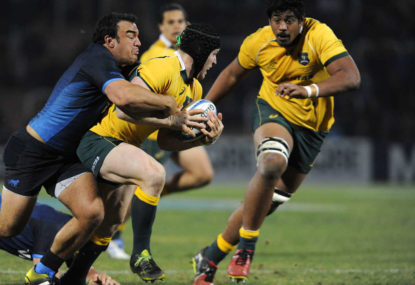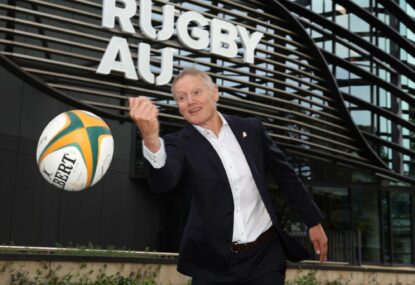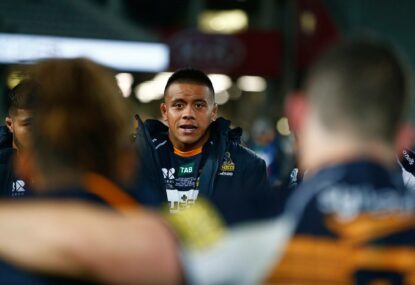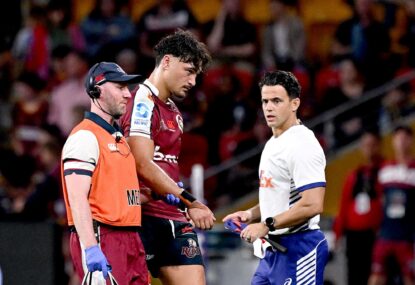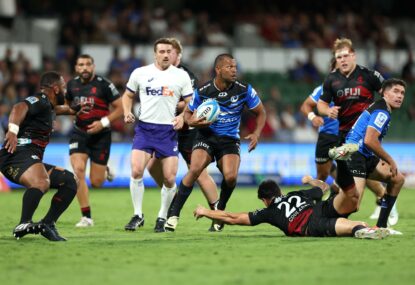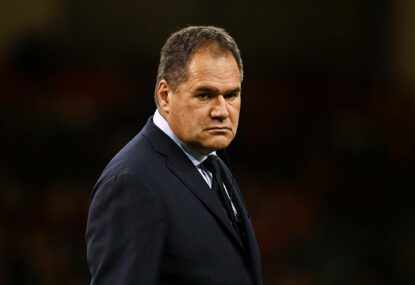What a difference a year makes. This time last year I wrote about how Australia coach Ewen McKenzie didn’t use his substitutes effectively or early enough.
He didn’t recognise that Matt Toomua was having a shocker at inside centre and left him on until the 70th minute. McKenzie also left a clearly hobbling Nic White on the field for 66 minutes before replacing him with Nick Phipps, who provided the Wallabies with clean, crisp ball from the base of the ruck.
On top of this, McKenzie only gave Will Skelton ten minutes, nowhere near enough time to have a substantial impact on the result.
Fast forward 12 months and we have almost the reverse situation. This time it was Nick Phipps and Bernard Foley starting for the Wallabies and struggling and instead of leaving the pair on, Michael Cheika replaced them early. And the difference was clearly notable.
On top of this, Skelton was given 22 minutes to make an impact – and make an impact he did.
Let’s start with Nick Phipps, the Waratahs starting halfback who has been struggling for form of late. Throughout the Super Rugby season his passes struggled to find the mark, they weren’t out in front of ball runners and often they had to reach for them.
Nevertheless, with the injury to Will Genia, Phipps has had the chance to make the Wallabies number nine jersey his own. On Saturday night he did anything but.
Phipps’ passes were off the mark more often than not, for most of the match he was either to slow or rushing himself and his teammates. He didn’t play well.
However Nic White was the halfback sitting on the bench and any fan who remembers Bledisloe 3 last year knows that it is always risky to put Nic White on the field in the dying minutes of a match. Cheika didn’t really have a choice, as soon as Phipps got himself sin binned in the 53rd minute it was pretty clear that his night was done.
White came on and played very well. His passes were flatter and out in front of the target, he slowed play down when he had to and played quickly when the Wallabies had front-foot ball.
While White wasn’t flawless, there were a few times he waited too long to clear the ball from the ruck, and not every pass found the mark, he was definitely an improvement on Phipps.
It will be interesting to see what Cheika does next week for the return bout, he could start Phipps and give him one last chance or he can give White the chance to prove himself and book his ticket to England.
It is fairly safe to assume that Genia will be chosen for the World Cup and highly likely that Cheika will only select two halfbacks after Robbie Deans blunder in 2011.
As such, Phipps and White are fighting for the other position and while Phipps holds the advantage right now, White may have the opportunity to overtake him next weekend.
It was clear that White played far better than Phipps during the 17 minutes he was on the field but White also had the advantage of playing with Matt Toomua and Will Skelton. When Phipps was playing with Foley for the first 50 minutes the Wallabies were playing very deep and wide in attack.
The forward runners were almost standing where a five-eighth would usually stand and were repeatedly monstered by a blitzing All Blacks defensive line.
Throughout the first half and the early stages of the second half the All Blacks committed just one defender to the breakdowns, it routinely took the Wallabies three attackers to clear the ruck of this one man.
While this was happening New Zealand got their defensive line set, spaced out across the field and got ready to rush up on the deep Wallabies attack. It would have been nice to see the Wallabies recognise this and start to pick and drive to suck the All Blacks in closer to the ruck and open up some space for the backs, however it was not to be and the backs remained as deep as ever, with very little space to attack.
This all changed, however, when Matt Toomua was injected into the game in the 50th minute. He played flatter, he played more direct, he played off the front foot and he took the defensive line on. He put the All Blacks defence in two minds and the effects were clear.
The Wallabies had far more front-foot ball and with the All Blacks retreating, they had more opportunities to attack. Praise must go to Cheika for not being afraid to bench his starting five-eighth and use Toomua early in the second half.
The increase in front-foot ball was not only a result of the Toomua substitution, the addition of Will Skelton in the 58th minute had a big impact on the match.
Skelton is so large and so hard to tackle that even when he was getting the ball standing still, he is able to power forward and use his big legs to drive himself over the advantage line.
This is what the Wallabies missed in the first half, a forward going forward and it was the reason why picking David Pocock and Michael Hooper together is so risky. To pick the pair you’re giving up a big ball runner like Wycliff Palu who is able to bend opposition defensive lines back.
Unlike a year ago, Cheika gave Skelton the chance to impose his big body on the game with 22 minutes to go. He gave him more than a quarter of the match to change the nature of the game against a tiring defence, and this is exactly what he did.
It would not surprise me if Cheika turns this role into a specialty for Skelton during the World Cup.
Michael Cheika used his substitutes early and he used them effectively on Saturday night. But in the grand scheme of things Saturday night means nothing now, all it means is that the Wallabies have earned the right to challenge for the Bledisloe Cup next Saturday in Auckland.
As we saw last year, a good showing in Bledisloe 1 means nothing if you lose Bledisloe 2 by 50. The All Blacks were clearly below their best at ANZ Stadium and they are never below their best at Eden Park.
If the Wallabies are to defeat New Zealand next weekend they will have to deliver a much improved performance from all 23 players in the squad.






























































































